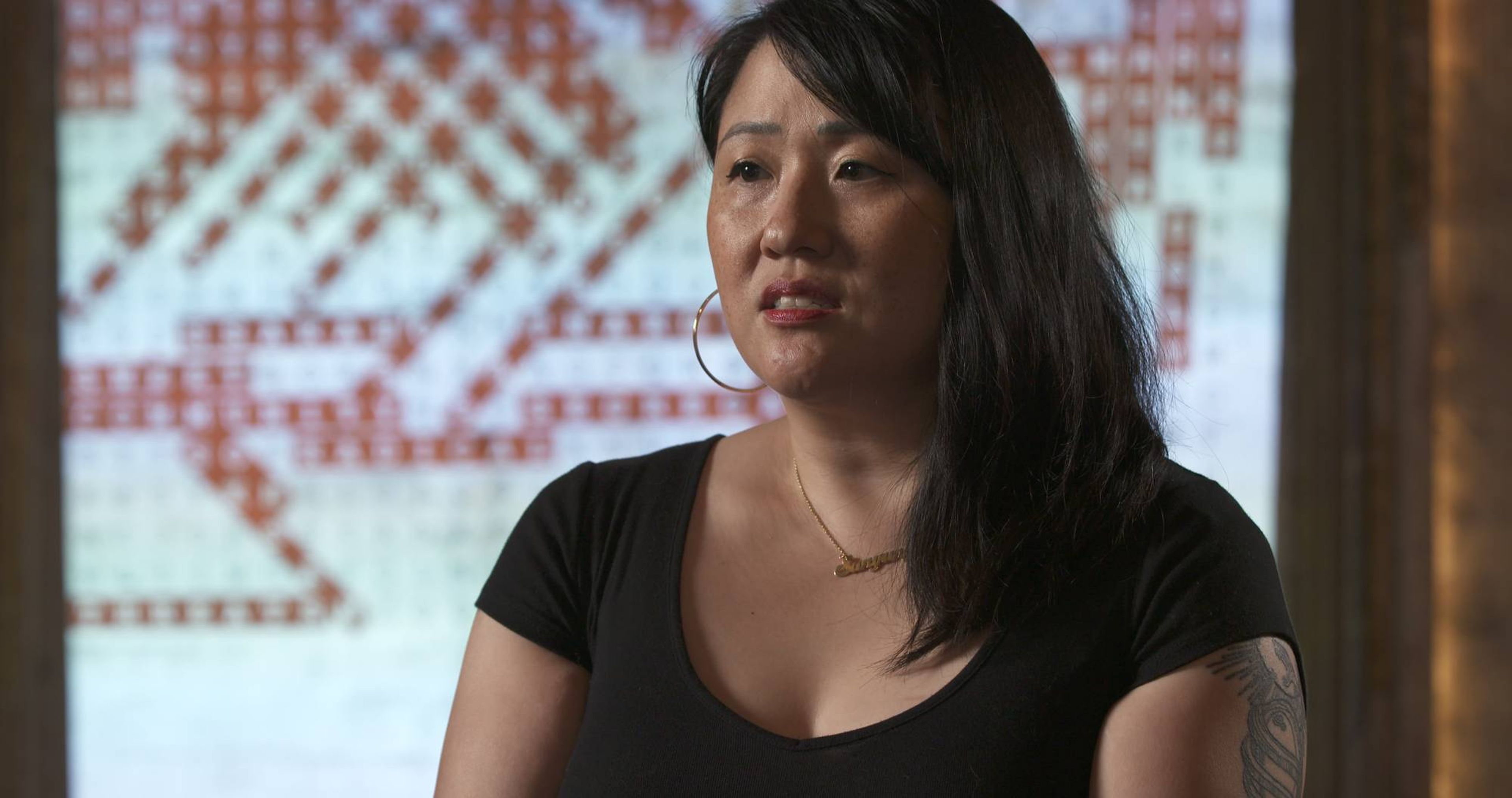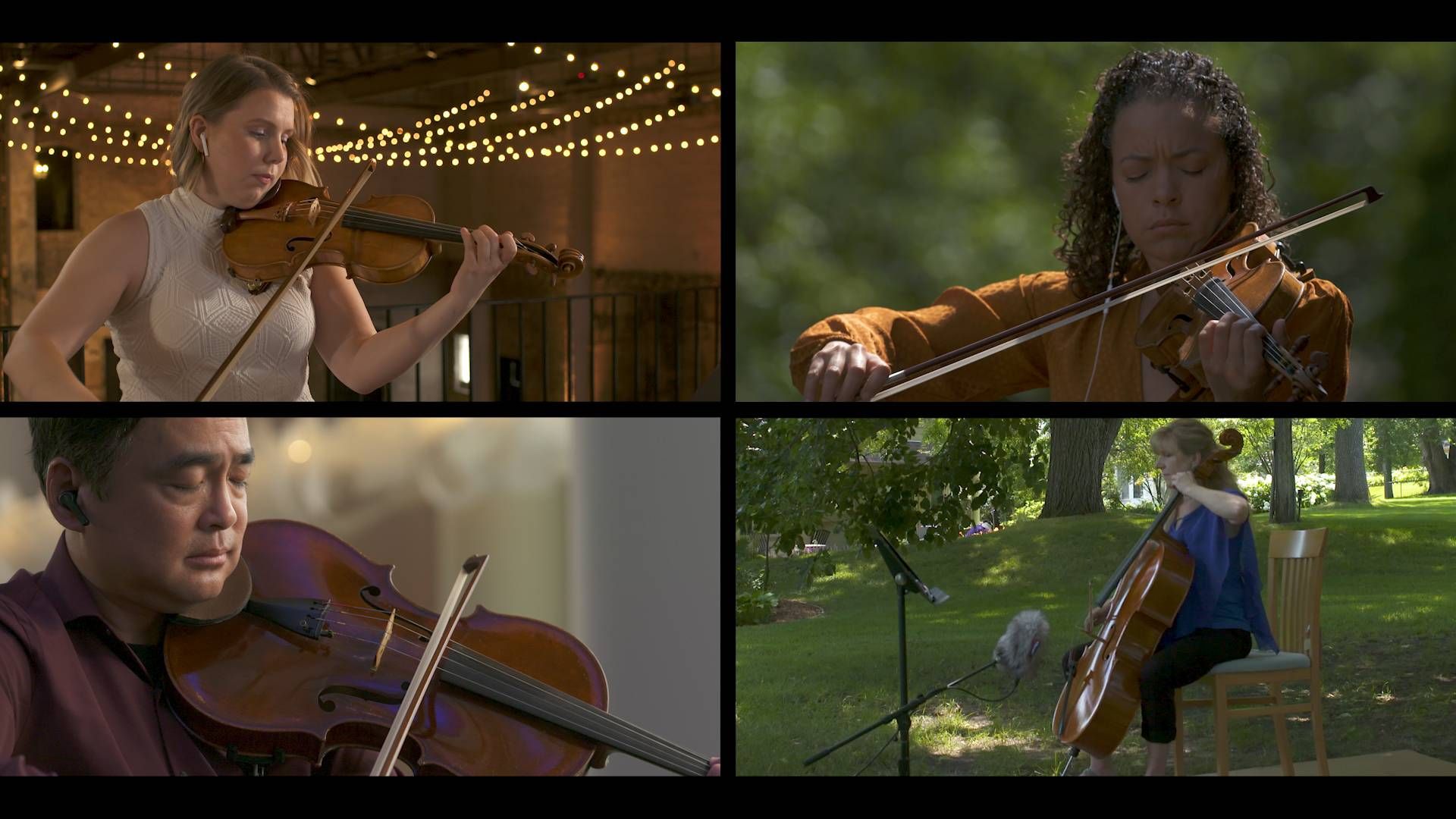The Pandemic Has Given Local Artists a Time for Reflection
Artists from Hippocrates Cafe reflect on their experiences since the filming of the production.
This summer, local artists explored the impact of COVID-19 through music, art, animation, photography, story, poetry and dance in Hippocrates Cafe: Reflections on the Pandemic, a co-production with the University of Minnesota Medical School's Center for the Art of Medicine.
In the production, co-hosted by Hippocrates Cafe founder Dr. Jon Hallberg and Dr. Renée Crichlow, artists joined together to share their talents onscreen in a moving series of performances. One viewer named Joe shared after watching:
Through the dark shadows of these days, shine the tears of joy.
Others viewers also chimed in:
"One of the things I value most about the arts is how appreciation and understanding of it requires not only a tolerance of ambiguity, but embracing the unknown. Traditionally, these are not often promoted in the world of science and medicine," offered a viewer named Nancy.
While another viewer named Sara said, "Thank you for an amazing collection of creativity towards helping us all heal and understand how we are interconnected."
GAO HONG
Many of the artists who performed in Hippocrates Cafe: Reflections on a Pandemic were also moved by their experience of being part of this production - like Gao Hong, a world-renowned Chinese pipa player and composer. Hong shared, "It was such an honor to be part of such a diverse and talented cast of artists."
"it was a great honor to be a part of a project that showed that no matter how bad things get, we can always overcome difficult times when we support each other and continue to express ourselves," She continued.
In Hippocrates Cafe, Hong performed of a piece to honor the many lives lost in the first wave of the pandemic:
Hong began her career as a professional musician at age 12. She graduated from the Central Conservatory of Music in Beijing, where she studied with pipa master Lin Shicheng. In 2018, she became the first Chinese musician to win a Sally Award from the Ordway Center for the Performing Arts.
The pandemic hasn’t stopped Hong from being creative. Since the filming of the show, she has continued to teach online at Carleton College. She prerecorded a solo pipa concert for the Smithsonian’s “Look and Listen” concert series, as well as a concert for the Schubert Club that will be broadcast next March. “I composed a double concerto for bassoon, pipa and orchestra that will be performed in 2022. I was also asked to represent North America in an international commissioning program to celebrate Beethoven’s 250th birthday. I was one of five Chinese composers commissioned to write and perform a piece based on Beethoven’s music that was broadcast worldwide from China.”
Due to COVID-19, the music industry has dramatically changed. “As a musician, just like all the musicians, all concerts and tours had to be canceled all over the world. Most performances had to be moved to online,” Hong says.
This also has had an impact on her work as a faculty member at Carleton College, where all of her lessons were moved to Zoom. “Even ensembles would meet online, as we were not able to rehearse in person. That made teaching much more difficult for the teachers and learning far more cumbersome for the students.
"It was indeed the most difficult time for musicians and teachers," she added.
All but one of her performances and teaching engagements had to be done online via Zoom or prerecorded for future streaming. "I’ve appeared on several radio and TV broadcasts in the U.S. and China, but all had to be prerecorded. The one live performance I’ve been involved with since March was live-streamed and performed before a small live audience. I wore a mask the entire performance and was separated from the audience by plastic barriers.”
NACHITO HERRERA
Beloved Twin Cities Cuban jazz pianist, Nachito Herrera, made a remarkable recovery from COVID-19 after 14 days in the ICU. The journey sparked the composition of "Esperanza," which he performed in Hippocrates Cafe: Reflections on a Pandemic.
Throughout the pandemic, Herrera says that music has been the biggest and best form of therapy. His newfound sense of hope after his experiences with COVID-19 have been a major source of inspiration to him as he continues to create new music, work on his technique and investigate composers, something he hasn’t done since he was a student at the University of Music in Havana, Cuba. “In this way, I am increasing my creativity on new styles and getting more solid my possibilities of creating and improvisation,” he said.
Herrera believes that the pandemic has brought big changes to the entertainment industry. But he believes that, thanks to innovative uses of technology, the industry has been able to survive. “I think we are on the risk of seeing the art disappear because we need the interaction with the audience. We have a big hope on the government and the institutions that they find the way to help bring the art back.”
Being a part of Hippocrates Cafe left an indelible mark on the musician.
"It was a very positive experience, bringing inspiration to many others with my experience and other people's stories, creating hope and strength in our community, learning and appreciating the most important thing we have - which is our life," he said.
He added that, "It is an inspirational program that takes us to a reflection and creates new tools to continue to enjoy our happiness with what we do have and not, with what we think we should have."
신 선 영 辛善英 SUN YUNG SHIN

Like Herrera, poet and author, 신 선 영 辛善英 Sun Yung Shin was proud to have been involved in the production.
"It was wonderful to be part of a multi-disciplinary project focused on public health and connectedness," she said.
In Hippocrates Cafe, Shin performed “In the Cut: Being Asian American in this Pandemic.” The unique poem takes shape within a "word-find puzzle." It is a simple and powerful litany of words from A to Z, painting the vocabulary of race and inequity spiked by the pandemic.
Since filming, she’s been staying creative. “I've been writing about the idea and practice of asylum, and I've been staying creative by making and selling jewelry,” she shared.
Shin is known for her poetry books and anthologies such as A Good Time for the Truth: Race in Minnesota, the poetry collection Unbearable Splendor, which won the 2016 Minnesota Book Award for poetry, and others. We asked her if anything has changed permanently due to the pandemic, and she replied, “I am not sure what has changed permanently, but I hope that after the pandemic ends, arts presenting organizations will continue to offer community members online access to classes, meetings and events.”
SIFEI CHENG

Access to music and arts beyond the pandemic is also on the mind of violinist Sifei Cheng, who joined the Minnesota Orchestra in 1995. “For those of us lucky enough to still be working, orchestras have had to be more flexible in terms of programming and how we produce concerts. Livestreaming has become the only way to engage large audiences safely, and it may need to continue even after the pandemic ends,” he shared.
Since filming Hippocrates Cafe, Cheng has been using this time to expand his chamber music repertoire. “I didn't pursue it much because I've been an orchestral musician my entire career.” And photography has also been another creative outlet for Cheng during this time. “When I play music, I see images in my head, so photography for me was a natural fit. Images can inspire music, and the reverse can also be true.”
In Hippocrates Cafe, Cheng joined other local musicians who performed from their balconies, front yards and other open spaces to honor frontline healthcare workers, like his brothers in California.
Cheng reflected on participating in Hippocrates Cafe, sharing, “I've always had the utmost respect for those in the medical field. Both my brothers are doctors who are fighting the pandemic in California."
"Medicine can mend wounds and cure diseases. Music can't do that, but it can lift the spirit and bring comfort to the soul."
He added, "I believe this project was about healing, so for me to be a part of something that combines medicine and music to fight a pandemic makes me feel closer to my brothers who are far away. For that, alone, I am grateful to have participated.”
CABIN OF LOVE
We’re all folded into this moment together.
As we head away from the familiar outdoor pandemic gathering spots of summer - porches and parks - and into our homes for winter, we invite you to listen to "Slowly Exploding" by Cabin of Love, and to reflect on what this time of quiet and isolation has meant to you.
Take heart my dear ones take courage my loves
It’s hard and it hurts and it’s real
But everything matters and everything breathes
And we’re not as alone as we feel
We’re all folded into this moment together
and this bomb is a seed waiting for the right weather
To break open with life like we haven’t known yet
Oh the height and the depth of love
Special Thanks: Jon Hallberg, MD
Featured Artists: Gao Hong, Nachito Herrera, Sun Yung Shin, Cabin of Love, MN Orchestra, MN Opera Orchestra, The Saint Paul Chamber Orchestra
Hippocrates Cafe: Reflections on the Pandemic is a TPT Partnerships coproduction with the Center for the Art of Medicine at the University of Minnesota Medical School.

This story is made possible in part by the Arts and Cultural Heritage Fund and the citizens of Minnesota.
If the wintertime scarcity of outdoor performances has left you with the blues, never fear: We have seven Pandemic Performances from local musicians that will bring a spring to your step.
For only a year and a half, the hardcore music scene in the Twin Cities rippled with exuberance, creative innovation and a healthy dose of grit. Check out the docu-series Minnesota Hardcore, which chronicles the short-lived, but pivotal, influence of hardcore music and the subculture that formed around it.
When COVID-19 first showed up in the U.S., G. Phillip Shoultz III, like many Americans, had no idea what was ahead. “All of us naively thought this is just going to be a few weeks and we’ll get back to our lives,” he reflects. But the director of the VocalEssence Singers of This Age youth choir quickly realized that wouldn’t be the case. So the choir got creative and performed this rousing choral tune on a downtown rooftop.
